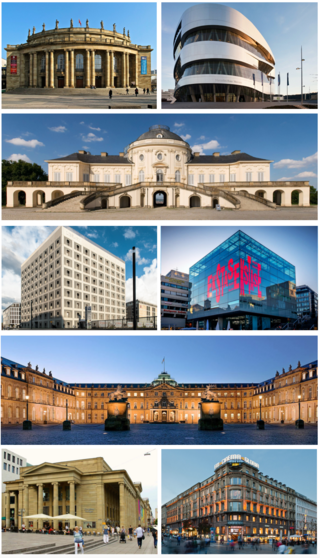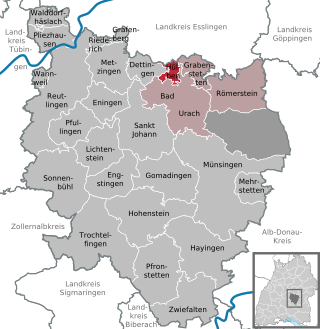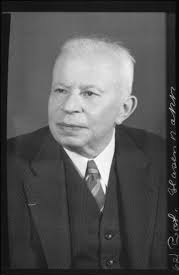Related Research Articles

Stuttgart is the capital and largest city of the German state of Baden-Württemberg. It is located on the Neckar river in a fertile valley known as the Stuttgarter Kessel and lies an hour from the Swabian Jura and the Black Forest. Stuttgart has a population of 635,911, making it the sixth largest city in Germany. 2.8 million people live in the city's administrative region and 5.3 million people in its metropolitan area, making it the fourth largest metropolitan area in Germany. The city and metropolitan area are consistently ranked among the top 20 European metropolitan areas by GDP; Mercer listed Stuttgart as 21st on its 2015 list of cities by quality of living; innovation agency 2thinknow ranked the city 24th globally out of 442 cities in its Innovation Cities Index; and the Globalization and World Cities Research Network ranked the city as a Beta-status global city in their 2020 survey. Stuttgart was one of the host cities for the official tournaments of the 1974 and 2006 FIFA World Cups.

Manfred Rommel was a German politician belonging to the Christian Democratic Union (CDU), who served as mayor of Stuttgart from 1974 until 1996. Rommel's policies were described as tolerant and liberal, and he was one of the most popular municipal politicians in Germany. He was the recipient of numerous foreign honours. He was the only son of Wehrmacht field marshal Erwin Rommel and his wife Lucia Maria Mollin (1894–1971), and contributed to the establishment of museums in his father's honour. He was also known for his friendship with George Patton IV and David Montgomery, the sons of his father's two principal military adversaries.

Friedrich Alfred Krupp was a German steel manufacturer and head of the company Krupp. He was the son of Alfred Krupp and inherited the family business when his father died in 1887. Whereas his father had largely supplied iron and steel, Friedrich shifted his company's production back to arms manufacturing. Friedrich greatly expanded Krupp and acquired the Germaniawerft in 1896 which gave him control of warship manufacturing in Germany. He oversaw the development of nickel steel, U-boats, the diesel engine, and much more. He died, possibly by suicide, in 1902 after being accused of homosexuality. His daughter Bertha inherited the company.

Carlo Schmid was a German academic and politician of the Social Democratic Party of Germany (SPD).

Hülben is a municipality in the district of Reutlingen in Baden-Württemberg in Germany.
Gerhard Scherhorn was a German Professor and economist.

Arnold Stadler is a German writer, essayist and translator.
The Bundesverband Öffentlicher Banken Deutschlands, colloquially known as Verband Öffentlicher Banken is a German national association of development banks and of the regional Landesbanks, which are part of the Sparkassen-Finanzgruppe and thus also members of the Deutscher Sparkassen- und Giroverband, plus a few additional members. Some of the latter now belong to the private sector, such as Internationales Bankenhaus Bodensee which belonged to the public sector until the 2000s.
Karl Aberle was a German publisher and politician of the Social Democratic Party of Germany. He was associate editor of the Neuen Württembergischen Zeitung.

Eberhard Fraas was a German scientist, geologist and paleontologist. He worked as a curator at the Stuttgarter Naturaliensammlung and discovered the dinosaurs of the Tendaguru formation in then German East Africa. The dinosaur Efraasia is named after him.
Hermann Behmel is a German geologist, paleontologist and ecological activist.
Wolfgang Zapf was a German sociologist.

Schloss Muskau is a schloss in the Görlitz district in the state of Saxony, Germany. It is located in an extended park, the Muskau Park, since July 2004 a UNESCO World Heritage Site. The building complex was developed over a long period. The present main building, called Neues Schloss, was built in the 19th century in Neo-Renaissance style, burnt down in 1945, and after decades as a ruin, was reconstructed until 2013.

Otto Max Helmuth von Glasenapp was a German indologist and religious scholar who taught as a professor at the University of Konigsberg in East Prussia (1928–1944) and Tübingen (1946–1959).

The Neckar-Odenwald Limes is a collective term for two, very different early sections of the Upper Germanic-Rhaetian Limes, a Roman defensive frontier line that may have been utilised during slightly different periods in history. The Neckar-Odenwald Limes consists of the northern Odenwald Limes (Odenwaldlimes), a cross-country limes with camps, watchtowers and palisades, which linked the River Main with the Neckar, and the adjoining southern Neckar Limes (Neckarlimes), which in earlier research was seen as a typical 'riverine limes', whereby the river replaced the function of the palisade as an approach obstacle. More recent research has thrown a different light on this way of viewing things that means may have to be relativized in future. The resulting research is ongoing.

Theodor Bergmann was a German agronomist and published author. Until 1981 he was Professor for international comparisons in agrarian policy at University of Hohenheim. Bergmann was “the last participant and eyewitness to the German labor movement of the Weimar era”.
Wolfgang Kermer is a German art historian, artist, art educator, author, editor, curator of exhibitions, art collector and professor. From 1971 to 1984 he was repeatedly elected Rector of the State Academy of Fine Arts Stuttgart and thus the first scientific and at the same time youngest teacher in this position in the history of the university. Under his rectorate, the State Academy of Fine Arts Stuttgart was reformed in 1975 and 1978 on the base of two new university laws of the State of Baden-Württemberg and thus, for the first time in its history, authorized to set up diplomas for all courses. One of the accents of his work was the promotion of talented graduates of the academy: In 1978 he organized the first of the so-called ″debutant exhibitions″, an ″unconventional contribution to the promotion of young people″, supported financially by the State of Baden-Württemberg.

Danyal Bayaz is a German politician of Alliance 90/The Greens who has been serving as State Minister of Finance in the government of Minister-President of Baden-Württemberg Winfried Kretschmann since May 2021. From 2017 until 2021, he was a member of the Bundestag.
Hannes Kilian was a German photographer.

Richard Karl Wilhelm von König-Warthausen also given as (Freiherr/Baron) Richard König von und zu Warthausen was a German nobleman and ornithologist. His collections of eggs and birds were transferred to the museum of natural history in Stuttgart in 1955.
References
- 1 2 3 4 5 6 "Willi A. Boelcke". deutscher Wirtschafts- und Sozialhistoriker; Prof.; Dr. phil. Munzinger-Archiv GmbH., Ravensburg. 9 October 1989. Retrieved 22 June 2021.
- ↑ Roel vande Winkel (author); Frieda Saeys (compiler-editor); Hans Verstraeten (compiler-editor) (2005). Wetenschappelijk onderzoek naar de dagbladpers in bezet België (1940-1944): evolutie van een onderzoeksdomein (1966-2005) .... Endnote 26. De media in maatschappelijk perspectief. Academia Press. p. 29. ISBN 978-90-382-0850-3.
{{cite book}}:|author1=has generic name (help) - ↑ Willi A. Boelcke (1967). Verfassungswandel und Wirtschaftsstruktur: die mittelalterliche und neuzeitliche Territorialgeschichte ostmitteldeutscher Adelsherrschaften als Beispiel. Habilitationsschrift Hohenheim. Jahrbuch der Schlesischen Friedrich-Wilhelms-Universität zu Breslau. ISSN 0341-9223.